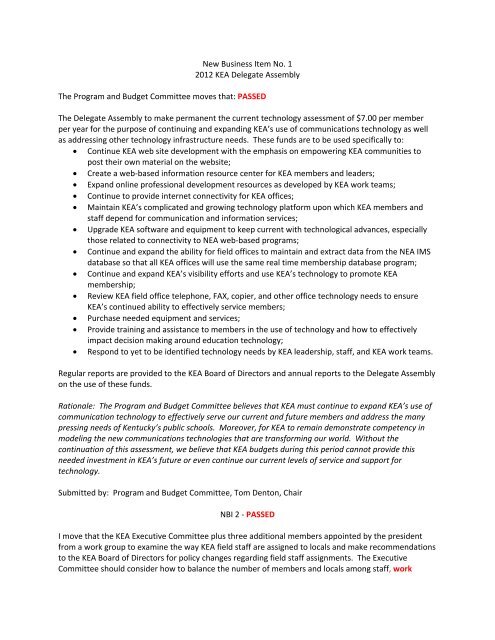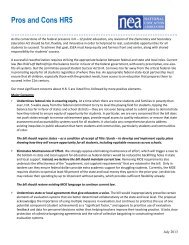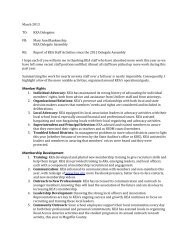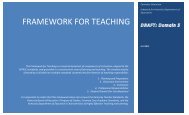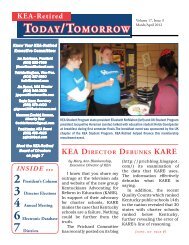New Business Item No. 1 2012 KEA Delegate Assembly The ...
New Business Item No. 1 2012 KEA Delegate Assembly The ...
New Business Item No. 1 2012 KEA Delegate Assembly The ...
Create successful ePaper yourself
Turn your PDF publications into a flip-book with our unique Google optimized e-Paper software.
<strong>New</strong> <strong>Business</strong> <strong>Item</strong> <strong>No</strong>. 1<br />
<strong>2012</strong> <strong>KEA</strong> <strong>Delegate</strong> <strong>Assembly</strong><br />
<strong>The</strong> Program and Budget Committee moves that: PASSED<br />
<strong>The</strong> <strong>Delegate</strong> <strong>Assembly</strong> to make permanent the current technology assessment of $7.00 per member<br />
per year for the purpose of continuing and expanding <strong>KEA</strong>’s use of communications technology as well<br />
as addressing other technology infrastructure needs. <strong>The</strong>se funds are to be used specifically to:<br />
� Continue <strong>KEA</strong> web site development with the emphasis on empowering <strong>KEA</strong> communities to<br />
post their own material on the website;<br />
� Create a web‐based information resource center for <strong>KEA</strong> members and leaders;<br />
� Expand online professional development resources as developed by <strong>KEA</strong> work teams;<br />
� Continue to provide internet connectivity for <strong>KEA</strong> offices;<br />
� Maintain <strong>KEA</strong>’s complicated and growing technology platform upon which <strong>KEA</strong> members and<br />
staff depend for communication and information services;<br />
� Upgrade <strong>KEA</strong> software and equipment to keep current with technological advances, especially<br />
those related to connectivity to NEA web‐based programs;<br />
� Continue and expand the ability for field offices to maintain and extract data from the NEA IMS<br />
database so that all <strong>KEA</strong> offices will use the same real time membership database program;<br />
� Continue and expand <strong>KEA</strong>’s visibility efforts and use <strong>KEA</strong>’s technology to promote <strong>KEA</strong><br />
membership;<br />
� Review <strong>KEA</strong> field office telephone, FAX, copier, and other office technology needs to ensure<br />
<strong>KEA</strong>’s continued ability to effectively service members;<br />
� Purchase needed equipment and services;<br />
� Provide training and assistance to members in the use of technology and how to effectively<br />
impact decision making around education technology;<br />
� Respond to yet to be identified technology needs by <strong>KEA</strong> leadership, staff, and <strong>KEA</strong> work teams.<br />
Regular reports are provided to the <strong>KEA</strong> Board of Directors and annual reports to the <strong>Delegate</strong> <strong>Assembly</strong><br />
on the use of these funds.<br />
Rationale: <strong>The</strong> Program and Budget Committee believes that <strong>KEA</strong> must continue to expand <strong>KEA</strong>’s use of<br />
communication technology to effectively serve our current and future members and address the many<br />
pressing needs of Kentucky’s public schools. Moreover, for <strong>KEA</strong> to remain demonstrate competency in<br />
modeling the new communications technologies that are transforming our world. Without the<br />
continuation of this assessment, we believe that <strong>KEA</strong> budgets during this period cannot provide this<br />
needed investment in <strong>KEA</strong>’s future or even continue our current levels of service and support for<br />
technology.<br />
Submitted by: Program and Budget Committee, Tom Denton, Chair<br />
NBI 2 ‐ PASSED<br />
I move that the <strong>KEA</strong> Executive Committee plus three additional members appointed by the president<br />
from a work group to examine the way <strong>KEA</strong> field staff are assigned to locals and make recommendations<br />
to the <strong>KEA</strong> Board of Directors for policy changes regarding field staff assignments. <strong>The</strong> Executive<br />
Committee should consider how to balance the number of members and locals among staff, work
assignments and also consider geographic issues. In conducting this study, the work group should<br />
gather information from members, local leaders, district leaders, the <strong>KEA</strong> Board of Directors, the staff<br />
union, <strong>KEA</strong> management, and other state affiliates of NEA. <strong>The</strong> work group will report their findings to<br />
the <strong>KEA</strong> Board at or before the April board meeting and to the 2013 <strong>KEA</strong> <strong>Delegate</strong> <strong>Assembly</strong>.<br />
Rationale: Currently, we have UniServ Directors who service more than 2000 members while others<br />
service only 500. Some UDs have 50 or more locals while others only have 10. Some school districts have<br />
local associations that are serviced by two UniServ Directors while other locals within the same school<br />
districts are serviced by the same UD. This creates an imbalance in UniServ Directors’ workloads as well<br />
as unfair system of member service, advocacy, organizing as well as member recruitment. <strong>The</strong> study<br />
would look at balancing field staff workloads through geography, number of members, potential<br />
membership and number of locals served.<br />
Submitted by: Sharron Oxendine, President<br />
NBI 3 = PASSED<br />
I propose that the <strong>KEA</strong> President form a work group of interested individuals, active and retirees,<br />
teachers and ESP, to learn more about the KRS and KTRS retirement systems. At the appropriate times,<br />
these individuals would be recommended for candidacy to run for positions on the KRS and KTRS boards<br />
of trustees.<br />
Rationale: With the passage of HB 300 during the <strong>2012</strong> General <strong>Assembly</strong>, term limits have been placed<br />
on KRS and KTRS board of trustees members. In the next five years alone, KTRS will lose more than half<br />
of its board members as their terms limits will be reached. To keep both systems strong, we should work<br />
to educate interested annuitants about the boards and their functions and create a “farm team” of<br />
future trustee members who will be ready and willing to serve as trustees.<br />
Submitted by: Mike Ross, E<strong>KEA</strong><br />
NBI 4 = PASSED<br />
I move that the <strong>KEA</strong> President, charge the Instructional Advocacy Work Team appoint a work team to<br />
address our member rights and responsibilities in response to being designated as a Priority (former<br />
PLA) School or as a Focus School. <strong>The</strong> charge for this work team will be to:<br />
� Identify <strong>KEA</strong> Leaders and Staff to serve on a “Swat SUPPORT Team” to assist schools that are<br />
currently designated as a PLA/Priority school or that are designated as such in the future. This<br />
team will be able to provide to members:<br />
o An overview by <strong>KEA</strong>/KDE on what legal responsibilities and actions must be taken and<br />
who is responsible for those actions once a school is classified as a Priority or Focus<br />
School.<br />
o An overview of what legal rights <strong>KEA</strong> members have in terms of:<br />
� Job security<br />
� Self‐governance<br />
� <strong>The</strong> ability to challenge decisions<br />
� Evaluations and individual growth and improvement plans
� <strong>The</strong> development of Priority/Focus School Action Plan for <strong>KEA</strong> leaders and members in current<br />
and future Priority/Focus schools to provide a reliable source of information and resources to<br />
protect member rights<br />
Rationale: Ongoing conversations at <strong>KEA</strong> Board meetings, E<strong>KEA</strong> Board meetings, and with teachers<br />
in schools that have been designated as Persistently Low Achieving/Priority/Focus schools, have<br />
identified some troubling and inconsistent information that is pervasive in the process. Problems<br />
include:<br />
� <strong>The</strong> lack of a reliable source of information and/or advice for <strong>KEA</strong> members who work in these<br />
identified schools<br />
� <strong>KEA</strong> members’ knowledge of the law pertaining to Priority/Focus School Status is limited<br />
� <strong>KEA</strong> members’ knowledge of the law pertaining to SBDM’s, tenure, and evaluation in<br />
Priority/Focus schools is limited<br />
� <strong>The</strong> scarcity of resource personnel to come into a district to aid in planning to address<br />
deficiencies is an increasing concern and possibility<br />
� Regulations consistently undermine Site Base Council’s role and responsibility in school<br />
improvement<br />
Funding: Because of budgetary constraints, we propose diverting funds from the Eastern Kentucky<br />
Technology Conference to provide initial funds to begin the process.<br />
Submitted by the Eastern Kentucky Education Association,<br />
Mike Ross, E<strong>KEA</strong>; Tim Holman moved to change Swat to Support‐ MOTION FAILED<br />
NBI 5 = FAILED<br />
I move that <strong>KEA</strong> have a membership table or presence at all education workshops and conferences<br />
within the state.<br />
Rationale: At a time when <strong>KEA</strong> membership is down and the need for <strong>KEA</strong> visibility in the state a<br />
necessity, this NBI would present <strong>KEA</strong> at all major education conferences within the state. In order to<br />
fulfill our mission and remain the preeminent voice of education in Kentucky we must present the<br />
benefits of <strong>KEA</strong> membership and collective voice in the state. By utilizing our 42,000 members statewide,<br />
this could be accomplished at minimal cost but render tremendous gains in membership and visibility.<br />
Submitted by: Merry Berry, E<strong>KEA</strong><br />
NBI 6<br />
Understanding that student performance and growth information has the valuable role for educators in<br />
their profession planning and growth <strong>KEA</strong> will actively oppose efforts to compel local school districts to<br />
implement teacher evaluation systems that would allow for the use of student test scores or increases in<br />
student test scores, such as “value added measures” in the summative evaluation of teachers.<br />
Rationale: Using test scores to evaluate teachers ignores other factors that are beyond the teacher’s<br />
control, such as student Health, home life, attendance, class size, curriculum materials, and<br />
administrative support. Research has shown student test scores are highly unstable, changing<br />
grammatically, from year to year for the same teacher. Placing even higher stakes on these typically
low‐ level knowledge tests drives instruction away from more challenging learning and, more<br />
importantly, these test scores have more to do with who takes the test than how they were taught. This<br />
is true even when statistical methods are used to “control” for student characteristics. Ranking teachers<br />
based on test scores would create the wrong incentives and undermine collaboration.<br />
Submitted by: Rick Jones, Boone County EA; Merry Berry moved to table NBI 6. Marie McMillen<br />
seconded. <strong>The</strong> motion to table NBI 6 PASSED.<br />
NBI 7 = PASSED UNANIMOUSLY<br />
<strong>The</strong> <strong>KEA</strong> Board should explore the options of actions available to members and friends of the education<br />
community in preparation for possible future assaults upon public education in this commonwealth and<br />
report back to the 2013 delegate assembly what actions were discussed.<br />
Rationale: Assaults on public education are increasing throughout the national arena. Being a visionary,<br />
proactive body, the <strong>KEA</strong> must begin the conversation of how best to prepare a response to this.<br />
Submitted by: Mickey McCoy, MCEA Retired<br />
NBI 8 = PASSED<br />
I move that <strong>KEA</strong> work with our <strong>KEA</strong> members on the Education Professional Standards Board to provide<br />
professional ethics and professionalism training in the workplace through our Instructional Advocacy<br />
Work Team.<br />
Rationale: Many faculty and staff need training and updates on professionalism and ethics. Situations<br />
arise daily and most school employees are not aware of the legalities involved.<br />
Submitted by: Barbara Boyd, JCTA<br />
NBI 9 = WITHDRAWN BY THE MAKER<br />
<strong>KEA</strong> should provide immediate and sustained support for members in PLA (persistently low achieving)<br />
schools by providing training, informational meetings concerning legal and professional ramifications,<br />
and a chance for teachers from various districts to compare their experiences.<br />
Rationale: Teachers in schools that have been labeled as persistently low achieving (PLA) are under<br />
extraordinary pressures from a community that has lost faith and administration that is looking for<br />
someone to blame. Teachers need more support and more changes to convene with other teachers to<br />
get the real picture of what is possible and what is expected.<br />
Submitted by: Nina McCoy, Martin County EA


